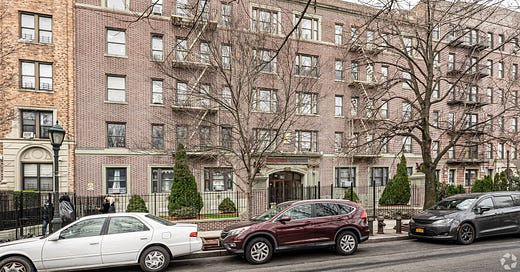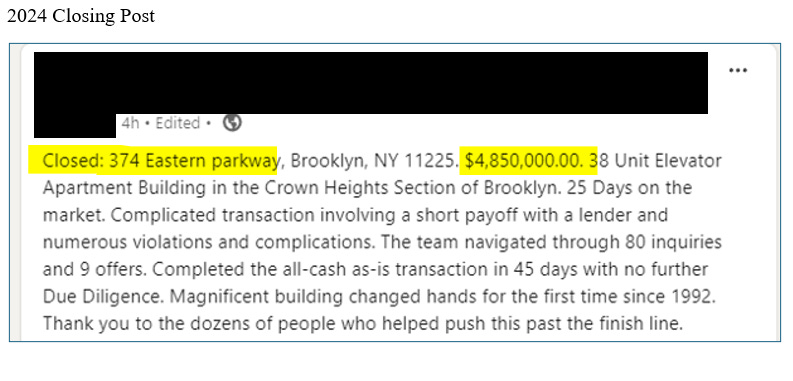Why New York Multifamily is Compelling
When the storm clears, will you participate in NYC's multifamily recovery?
After March's inflation reading, Federal Reserve officials finally admitted to endorsing the "higher for longer" movement. The problem with March's Core CPI of 2.8% that has influenced the shift towards higher for longer is that it belies a more aggressive trend of recent inflation. The six months ending in December saw a Core CPI inflation level of 1.9%, in line with the Fed's target of 2.0%, but the Core CPI data for the six months ending in March were at 3%. Inflation data stunned the Fed to the point that talk emerged of the Fed even considering rate hikes. Though a rate hike seems unlikely, the fact that Fed officials are raising the possibility of doing so should signal to the market that the prospect of a significant and swift rate reduction to save everyone is out of the picture.
While the 'higher for longer' rate environment poses challenges for owners and real estate investors, it's essential to consider the potential benefits of being in NY long term. When the recovery sets in, owning NYC multifamily properties could offer significant upside potential. Will you seize this opportunity and benefit from the market recovery?
The discounts in pricing are here.
There will be more coming, but some are here now.
They are in front of you.
Here is a deal story in case you are not yet convinced.
374 Eastern Parkway - Sale
38 Multifamily Units
Crown Heights, Brooklyn
The timeline:
2017: Loan taken out for $3,200,000
2022: Listed for sale at $9,500,000
2023: Listed for sale at $7,000,000
2024: Listed for sale at $5,250,000
2024: Sold for $4,850,000
374 Eastern Parkway was in financial distress. The ownership owed several years of property tax arrears to NYC and faced over 200 violations. On top of this, the ownership was facing a maturity cliff on their existing loan that wouldn't allow for a cash-out, or cash-neutral refinance transaction. That means the sponsor would have had to insert equity into the deal to satisfy a loan origination on the property.
Business case: At $4,850,000, the buyer gets a basis of $127,000 per unit, with an average rent per unit of ~$1,500 per month, or ~$18,000 per year. That's a 7x GRM. With expenses per unit just under $10k, each unit makes $8,000 in net income, equal to an in-place 6.4% cap. That's good if the buyer uses only cash. Still, there are a lot of headaches that come with the building, such as violations and arrears. But then, the rents are, on average, about 40% below market. Based on the back of the napkin calculations below, this deal stabilizes in maybe year 3 at a ~10% annual return on total project costs. That's not to mention the potential future exits that may be possible. 15-18x GRM sales have happened in the past. They may happen again. Take a closer look at some numbers below.

Deal photos
Listing
Closing
I am bullish on NYC multifamily. Call me at 212 658 1471
Sources: CoStar and B6 Real Estate Advisors







in order for NYC rent stabilized properties to become a business again, where noi grows at least with inflation, the rent laws need to change. Even if rates come down it won't fix the shrinking NOI. The reason why all rent stabilzed properties were able to maintain profitablity in the past was due to the vacancy bonus, Mci and IAI. Under the current laws all apartment rents will shrink relative to operating cost over time even if the RGB increase the rents for a few years, they won't do so year after year. The proof is there are so many apartments which the legal rent is under the operating cost due to tenant longevity. Apartmentrs with longevity did not have Vacancy Bonuses or IAI and rents stayed very low. Under current law there are no apartments which have vacancy bonus and IAI is negligible. For Example we have apartment 3B which legal rent is 2800, apartment 4b legal rent is 800, operating cost is 1300. Had the current laws been in effect for the last 30 years all apartments would have a rent of 800 and 3b would also be 800 today. 3b Went up due to IAI and Vacancy Bonus due to turnover. We need the governement to change their sentiment and realize that they have created a real problem.
We are seeing NOI shrinking year over year due to low increases and high expenses in stabilized properties. Unless you think cap rates will go down significantly the building value will be less in the future with lower NOI. Rgb has never given enough increases to stay ahead of inflation.